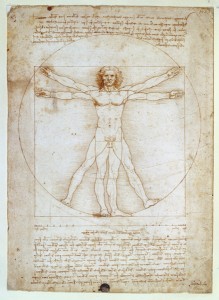Biotechnology and art has lead to scientific and artistic
advances as seen in this week’s lecture. The Renaissance breathed life into an
art movement focusing on the idealized human body. This focus on the human form
can be seen in Leonardo’s Vitruvian Man and Michelangelo’s David.
Figure 1: Leonardo's Vitruvian Man displays ideal human proportions. [Source: www.italianrenaissanceresources,com]
With the growth
of biotechnology, there is an ability to genetically render the ideal human
body. Current technology provides parents with more control over what attributes
their future child will possess. In addition, there are means for determining a
risk of contracting certain diseases or being born with a defect {Gerard, E.). The manipulation of human genetics is an
opportunity to fulfill the Classical treatment of the human body, but it is
also a topic of heated debate.
Eugenics is the act of selective breeding humans in order to
promote the spread of a certain gene, and suppress others. There also exists a
realm of genetic manipulation and transgenic operations that would look to
optimizing or enhancing human capability. Putting the questionable ethicsaside, the pursuit of the idealized human form has penetrated modern art and
society. Nietzsche brought forward the
idea of the Ubermensch or “over man” as a means of philosophical discussion of
what a man should be (Nietzche). The concept of the Ubermensch went on to
inspire the most classical superhero of the modern era: Superman.
Figure 2: Superman is the modern day incarnation of Nietzsche's Ubermensch. [Source: www.sea-globe.com]
The world has
a fascination with these comic book super heroes as they excel the natural laws
of humanity and define what it means to be better than human. Superman, with
his restraint of unlimited strength has become a figure of what a man, culture,
or society should be. Another superhero
that has been born of genetic modification is Captain America. As opposed to
Superman’s strength to carry skyscrapers, Captain America is the story of a
frail man brought to the best of human potential through the use of genetic
modification. These figures pervade modern pop culture and hark back to the
original Renaissance and Classical image of the human body.
Figure 3: Captain America as a by-product of genetic experimentation in humans. [Source: www.rellimzone.com]
With the state of modern biotechnology, scientists have the
capability and the burden of determining everything a human should be for
generations to come.
Works Cited
Burkhardt Jr., Todd. "Operation Rebirth: Captain
America and the Ethics of Enhancement." Philosophy Now. 2007. Web. 10 May
2015.
. Garrard, Eve, and Stephen Wilkinson. "The Language of
Eugenics." Eugenics and the Ethics of Selective Reproduction (2013). Keele
University. Web. 10 May 2015.
"Nietzsche's Idea of an Overman and Life from His Point
of View." Stanford University. Web. 10 May 2015.
"The Classical Image of the Body." Italian
Renaissance Learning Resources. National Gallery of Art. Web. 10 May 2015.
"TOP 5: SUPERHERO SOCIAL COMMENTARIES." Globe. 27
June 2013. Web. 10 May 2015.



Hi Jeff! I wrote a similar blog post to yours about genetic modification of humans, but found it interesting how you took a different take on it. I think eugenics has a typically bad connotation as it suggests that there is an 'ideal' look for humans and superiority of certain races to others. However, as you mention, it still exists in art and technology today in other forms, such as designer babies (which was what I wrote about). While it can definitely be used for good, I do think you're right in that scientists in future generations must decide how it is used and to what extent people can modify themselves. I also wonder if we'll ever be able to create super-humans such as Captain America!
ReplyDeleteI like how you went further into this topic by including genetics. I had commonly thought about the aesthetics when it comes to biotech and art. The alteration of of genes is also a part of this conversation. I think there is more debate around that topic due to the fact it is more invasive than simply changing physical appearance. By altering genes you will consequently alter the rest of the living organism. Throughout history we have always been fascinated with human alterations. You brought up great examples from actual history and pop culture regarding society's obsession with human experimentation.
ReplyDelete